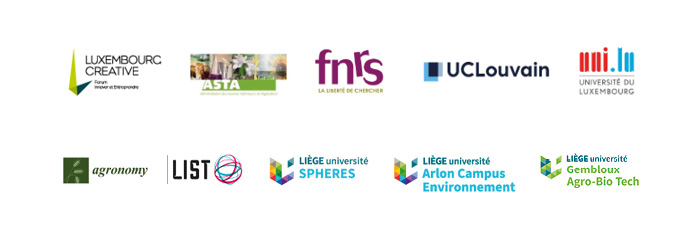Enhancing smart and sustainable farming systems
International Interdisciplinary Colloquium

Infos
185 Route de Longwy
6700 Arlon
L’agriculture de précision au service de la transition : comment réduire drastiquement et efficacement l’usage des pesticides ?
L’agriculture est aujourd’hui confrontée à plusieurs défis majeurs résultant de plusieurs facteurs d’ordre aussi bien environnemental que socio-économique. L’un des plus importants étant notamment celui d’augmenter significativement sa production à l’horizon 2050 pour être en mesure de nourrir une population mondiale croissante, tout en préservant l’environnement. Autrement dit, satisfaire les besoins alimentaires des générations présentes sans compromettre la capacité des générations futures à satisfaire les leurs. Face au développement de souches de plus en plus virulentes des maladies phytopathologiques et à la résistance de certaines de ces maladies aux effets des pesticides, il est plus qu’important d’accélérer le développement d’une agriculture raisonnée reposant sur des traitements phytosanitaires pertinents et opportuns.
Le colloque L’agriculture de précision au service de la transition vise ainsi à être ce cadre d’échanges et de partages d’expériences autour de thèmes variés. Ces derniers incluent les récentes recherches scientifiques et technologiques en agriculture de précision et les facteurs d’adoption de ces technologies. Il ne faut pas oublier non plus l’utilisation et la valorisation des données, de plus en plus nombreuses et diverses dans un monde numérique, et les différents défis liés à une transition rapide vers une agriculture numérique/de précision durable.
Autant de sujets qui, sans nul doute, permettront de « prendre le pouls », en temps réel, des experts participant au colloque sur toutes ces questions d’actualité.
Le colloque sera dispensé en français et en anglais (avec une traduction simultanée vers le français pour ceux qui le désirent).
Version Anglaise
Modern agriculture faces several major challenges including a substantial increase in agricultural production by at least 50% by 2050 to feed the growing world population while preserving the environment. That is, feeding present generations without compromising the future. Given the development of increasingly virulent strains of plant diseases and the resistance of some of these diseases to agrochemicals, it is crucial to develop integrated plant protection strategies for effective and timely phytosanitary treatments to achieve sustainable and profitable farming activities.
The colloquium "Precision farming at the service of transition" aims at promoting and encouraging scientific debates and sharing of experiences around various themes including recent scientific and technological research in precision agriculture and the factors involved in adopting these technologies. We should also not forget the use and development of data, which is increasingly numerous and diverse in a digital world, and the various challenges linked to a rapid transition to sustainable digital/precision agriculture.
All these topics will undoubtedly allow the experts participating in the conference to “take the pulse”, in real-time, of all these current issues.
Programme
8:30 – 9:00 - Welcome coffee
Morning Session
Chairman: Prof. Bernard Tychon
9:00 - 9:30
« 20 ans d’échanges scientifiques entre le Département en Sciences et Gestion de l’Environnement et le Grand-duché de Luxembourg »
Prof. Bernard Tychon, Département des Sciences et Gestion de Environnement, ULiège
Prof. Lucien Hoffmann, Luxembourg Institute of Science and Technology.
9:30 – 10:00
« Caractérisation moléculaire des pathogènes au service de la prédiction et de la gestion des épidémies en grande cultures »
Prof. Anne Legrève, Earth and Life Institute, UCLouvain
10:00 – 10:30
« L’agriculture de précision au service des systèmes innovants de production adaptés au milieu urbain et péri-urbain »
Prof. Haïssam Jijakli, Professeur Ordinaire, Gembloux Agro-Bio Tech ULiège
10:30 – 10:45 Coffee break
Chairman: Dr. Michaël Eickermann
10:45 – 11:30
“Edge AI for Agrifood: Hype or Hope?”
Prof. Said Hamdioui, Chair Professor on Dependable and Emerging Computer Technologies, Head of the Quantum and Computer Engineering department, serving as Head of the Computer Engineering Laboratory (CE-Lab) of the Delft University of Technology, the Netherlands.
11:30 – 12:15
” The original tool for disease severity assessment: status of visual estimation”
Knowledge of the quantity of disease is crucial to many endeavors in plant pathology and related disciplines (for example, to understand the impact on yield loss). Historically, all plant disease assessment was performed by visual estimation. Even in 2022, the majority of studies rely on individuals to correctly detect disease, and subsequently identify and quantify it for both estimates of incidence and severity, where incidence is the proportion of units diseased, and severity is the quantity of diseased perceived on the unit. Incidence is an easier metric to quantify as it is a yes/no response. Severity, when based on the proportion or percentage of the unit diseased can be more challenging to estimate visually. Since the first attempt by Cobb in 1882 to quantify disease severity, there have been substantial advances in understanding error in visual plant disease severity estimation, and the development of new methods and tools as aids to improve the accuracy of visual estimates for individual raters and among raters. These will be discussed, best-operating practices for plant disease estimation presented, and the future role of digital, sensor-based technology acknowledged.
Dr. Bock Clive, Research Plant Pathologist, USDA, Agricultural Research Service U.S. Department of Agriculture.
12:15 – 13:30 Lunch
Afternoon Session
Chairman: Prof. Anne-Claude Romain
13:30 – 13:50
« Valorisation de l'information géographique en agriculture de précision »
Dr. Louis Kouadio, Chercheur, Senior Research Fellow Integrated Agricultural-Climate Science Modelling. Centre for Applied Climate Sciences, University of Southern Queensland, Australia.
13:50 – 14:10
” Precision agriculture – challenges and opportunities for plant bacteria and viruses management”
Plant pathogenic bacteria and viruses are challenging pests in plant protection. There is a lack of direct control measures. Yet, precision agriculture is offering new tools and approaches for improving the management of those diseases. Recent innovations in the early field detection of plant diseases, the assessment of their spatial distribution will be reviewed. A focus on quarantine diseases like Xylella fastidiosa, Xanthomonas citri pv. citri or Huanglongbing will be given. Emerging surveillance approaches, as well as participatory approaches like the application appi.be will be advertised. The presentation will also be the opportunity to underline the challenges lying ahead of the wide-scale implementation of precision agriculture in this field.
Trends in molecular diagnosis and diversity studies for phytosanitary regulated Xanthomonas, V Catara, J Cubero, JF Pothier, E Bosis, C Bragard, E Đermić, MC Holeva, ...
Microorganisms 9 (4), 862
Update of the Scientific Opinion on the risks to plant health posed by Xylella fastidiosa in the EU territory, C Bragard, K Dehnen‐Schmutz, F Di Serio, P Gonthier, MA Jacques, ...
EFSA Journal 17 (5), 38, 2019
Long-term management of rhizomania disease—Insight into the changes of the beet necrotic yellow vein virus RNA-3 observed under resistant and non-resistant sugar beet fields,
Y Galein, A Legrève, C Bragard
Frontiers in plant science 9, 795
Prof. Claude Bragard, Ordinary Professor, Earth & Life Institute, Applied Microbiology-Phytopathology, UCLouvain.
14:10 – 14:30
“Digital Phenotyping for the assessment and monitoring of plant diseases” (by teams)
Prof. Anne-Katrin Mahlein, Professor, Director of the Institut für Zuckerrübenforschung an der Universität Göttingen.
14:30 – 14:45: Coffee Break
Chairman: Dr. Jürgen Junk
Group Leader Agro-environmental System, Environmental Research and Innovation Department (ERIN). Luxembourg Institute of Science and Technology (LIST)
14:45 – 15:05
“Remote sensing-based fruit detection in hazelnut orchards.”
Dr. Mario Gilcher, Remote Sensing and Geoinformatics Department, University of Trier
15:05 – 15:25
“Decision support tools as smart tools to adapt plant protection to climate change”
Dr. Jürgen Junk, Group Leader Agro-environmental System, Environmental Research and Innovation Department (ERIN). Luxembourg Institute of Science and Technology (LIST)
Dr. Michaël Eickermann, Luxembourg Institute of Science and Technology (LIST)
15:25 – 15:45
“Precision farming: promises (and perils) of Artificial Intelligence and Edge Computing from a Software Engineering perspective”
Prof. Dr. Tegawendé F. Bissyandé, University of Luxembourg.
15:45 - 16:00 Coffee break
16:00 - 16:15
"Dynamics of wheat growth by close-range multimodal machine vision"
Prof. Benoit Mercatoris , Agro-Bio Tech Gembloux, ULiège Belgium.
16:15 - 17:00 Panel discussions
Is edge AI the solution for todays’ agrifood challenges?
Animation: Prof. Said Hamdioui, Delft University of Technology, The Netherlands
Panelists: Dr. Jürgen Junk (LIST, Luxembourg), Prof. Dr. Tegawendé F. Bissyande (University of Luxembourg), Prof. Anne Legrève, (Earth and Life Institute, UCLouvain), Prof. Bernard Tychon (ULiege), Dr. Michaël Eickermann (LIST, Luxembourg), Prof. Benoit Mercatoris (Agro-Bio Tech Gembloux, ULiège)
17:00 – 17:15 Closing and conclusion of the symposium
Prof. Henri Maraite , Ordinary Professor, Professor Emeritus, Earth and Life Institute UCLouvain.
Steering Committee
- Dr. El Jarroudi Moussa, Senior scientist, Qualified researcher, Department of Environmental Sciences and Management, Université de Liège (ULiege), Head of the Steering Committee
- Prof. Pierre Stassart, President of the Department of Environmental Sciences and Management, Université de Liège (ULiege)
- Ms. Christelle Gillet, Project Manager, Interface, Université de Liège (ULiege)
- Ms. Marie Lang, Researcher, Coordinator of the Go Transition.s project, Department of Environmental Sciences and Management, Université de Liège (ULiege)
- Dr. Philippe Delfosse, Strategic Advisor to the Vice-rector for Research, Université de Luxembourg
- Prof. Lucien Hoffmann, Director of the Environmental Research and innovation department at the Luxembourg Institue of Science and Technology (LIST)
- Prof. Anne Legrève, Earth and Life Institute, UCLouvain
- Prof. Aurore Degré, Agro-Bio Tech Gembloux, ULiège
Partenaires et organisateurs

Agronomy (ISSN 2073-4395; CODEN: ABSGGL; JCR-Q1 (Agronomy)) is an international, scientific, peer-reviewed, open access journal published monthly online by MDPI, which is indexed within Scopus, SCIE (Web of Science), AGRICOLA, AGRIS, and many other databases. See more details, please click here: https://www.mdpi.com/journal/agronomy.




